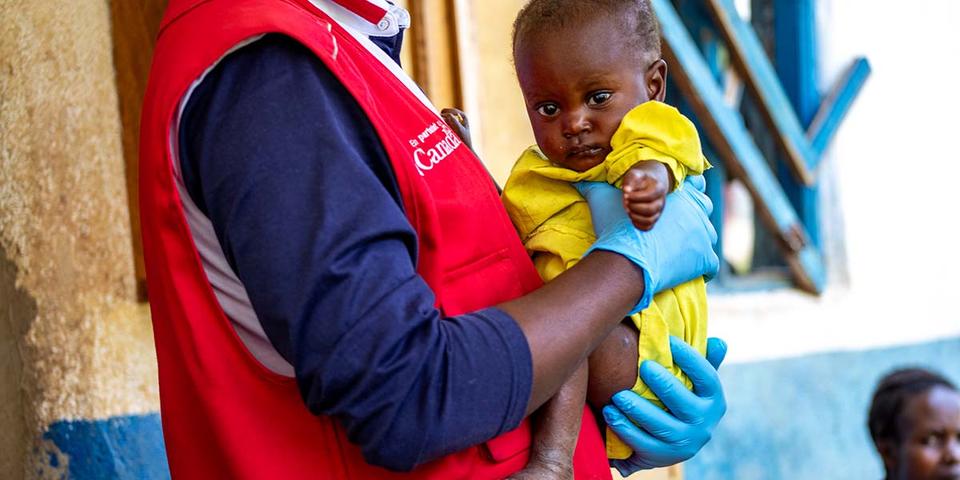World Humanitarian Day 2025: Stories from the Frontlines
Justin*, a humanitarian worker with Save the Children, is on the frontlines of one of the world’s most dangerous conflicts. Based in Goma, Democratic Republic of Congo (DRC), he focuses on surveillance and health promotion—critical work in a region where violence and instability fuel one of the most severe humanitarian crises today.
For World Humanitarian Day 2025, Justin shares his powerful story of survival, resilience, and commitment to ending suffering as an aid worker in the DRC.
Why I Became a Humanitarian Worker
I am Justin, an aid worker based outside of Goma in eastern Democratic Republic of Congo (DRC)—a region that has never known sustained peace in my 46 years.
I decided to become a humanitarian worker for two reasons: first, because it's my passion to help others. Growing up surrounded by recurring conflicts, I always knew I wanted to help those who are suffering. The second is because of the sheer scale of need in the DRC, particularly in Kivu—especially among children, as well as pregnant and breastfeeding women, who are the most vulnerable.
Since my childhood, the situation in eastern DRC has never really improved; it only seems to get worse. Today, I am the father of seven children, aged 18 months to 17 years—two boys and five girls—who are growing up in the same cycle of violence and uncertainty as I did.
The Dangers Humanitarian Workers Face
The current atmosphere in the DRC is one of terror, marked by constant gunfire, fear, and frustration. Where going to sleep and hoping to wake up alive feels like a gamble. Where not even humanitarian workers are safe.
The DRC is one of the most dangerous places for aid workers today. I am considered one of the “lucky” ones because I have never been physically harmed by the conflict, although I carry scars mentally from what I have lived through and witnessed. But many here have faced kidnappings, forced detention, physical abuse, robbery, and even killings. These are people who have dedicated their lives to saving lives.
Despite the many challenges I face as an aid worker, especially when we travel through more insecure areas—where there are dead bodies on the side of the road and burnt-out vehicles—my family believes I must continue helping others, even knowing I may never return.
But the dangers facing aid workers do not stop when we return from a mission and go home.
Over a year ago, heavy weapons were installed in the hills overlooking our village. Now, nearly every day, these weapons are fired, creating fear and terror in my family.
The last time we fled our home was in January, during the capture of Minova, when the road to Goma was closed due to insecurity. My children, wife, and I escaped under the fire of bombs and bullets, crossing Lake Kivu in a motorized canoe after walking nearly 30 km to the boat. None of my family can swim, and there weren’t enough lifejackets, so the risk of drowning was high. My children were exhausted, dehydrated, and terrified.
We eventually reached Goma, where we stayed with a host family for 18 days, during which housing, food, and safety were not guaranteed. We left everything behind, deeply affecting us both mentally and financially.

An aid worker holds a baby in his arms as part of a consultation at a health center in the Democratic Republic of Congo.
Ten Years of Humanitarian Work Amid Crisis
I’ve been a humanitarian worker for over a decade, and in that time, I’ve done my best to cope and hold onto my passion for helping others—even if not in the way I once imagined, as I find myself being indirectly impacted by the escalating conflict and witnessing the most cruel atrocities.
Each day, I see the terror this conflict is instilling in people, with fear etched into the faces of those around me—a daily reminder that in the DRC, survival is never guaranteed, not even for humanitarian workers.
Although year-on-year, the world is becoming more dangerous for humanitarian workers, we still head toward gunfire, checkpoints and danger. We do not give up – and the world must not give up on us. We cannot accept a world where those who save lives are targeted for it. I certainly won’t.
Why World Humanitarian Day Matters
On World Humanitarian Day, we honor the courage of aid workers like Justin who risk their lives to protect others.
We must not accept a world where those who save lives are targeted for it. As Justin says: “We do not give up – and the world must not give up on us.”
On World Humanitarian Day, we also stand in solidarity with children enduring relentless war, ruthless suffering, and extreme deprivation, as well as frontline responders working every day to save their lives, while risking their own. Sadly, funding for child-focused humanitarian assistance has been gutted.
Join our sister organization, Save the Children Action Network (SCAN) and Tell Congress: Protect humanitarian aid. Defend civilians. Don't let children die waiting for help.
